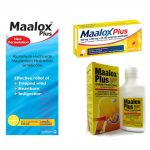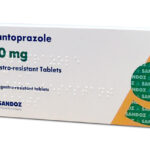Ulcuprazole Caps: Uses, Dosage, Side Effects, Interactions

Ulcuprazole is a common brand of omeprazole a medication that is widely used to treat various gastrointestinal conditions, such as gastroesophageal reflux disease (GERD), peptic ulcer disease, and dyspepsia.
It belongs to the class of proton pump inhibitors (PPIs), which work by reducing the amount of acid produced in the stomach. In this article, we will explore the uses, side effects, precautions, and other important information about omeprazole.
How does it work?
Ulcuprazole is a PPI that inhibits the enzyme H+/K+-ATPase in the stomach parietal cells, which is responsible for the secretion of acid. By inhibiting this enzyme, omeprazole reduces the amount of acid produced in the stomach, thus preventing acid reflux, GERD, and other conditions.
Ulcuprazole is commonly used to treat the following conditions:
1. Gastroesophageal reflux disease (GERD): GERD is a condition where the stomach acid flows back into the esophagus, causing irritation and inflammation. Ulcuprazole reduces the amount of acid in the stomach, preventing the reflux of acid into the esophagus.
2. Peptic ulcer disease: Peptic ulcers are open sores that develop on the lining of the stomach or the duodenum (the first part of the small intestine). Ulcuprazole reduces the amount of acid in the stomach, allowing the ulcer to heal.
3. Dyspepsia: Dyspepsia is a condition where a person experiences discomfort or pain in the upper abdomen. Ulcuprazole reduces the amount of acid in the stomach, relieving the symptoms of dyspepsia.
4. Zollinger-Ellison syndrome: Zollinger-Ellison syndrome is a rare condition where a tumor in the pancreas or duodenum produces excess amounts of the hormone gastrin, which stimulates the production of acid in the stomach. Ulcuprazole is used to reduce the amount of acid produced in the stomach.
Dosage and administration
The dosage of Ulcuprazole varies depending on the condition being treated, the age of the patient, and other factors. It is important to follow the dosage instructions provided by the doctor or pharmacist.
The following table lists the dosing instructions for Ulcuprazole.
| Use | Ulcuprazole Dosing instructions | Frequency of Ulcuprazole use |
| intestinal ulcers in adults | 20 mg once daily | 4 weeks, but some people may require a total of 8 weeks |
| H. pylori infections, along with 2 antibiotics | 20 mg twice daily along with 2 antibiotics | 10 days |
| H. pylori infections, along with 1 antibiotic | 40 mg once daily along with 1 antibiotic | 14 days |
| stomach ulcers in adults | 40 mg once daily | 4–8 weeks |
| GERD in people aged 1 and above | 20 mg once daily | 4–8 weeks |
| maintain healing of erosive esophagitis in people aged 1 and above | 20 mg once daily | studies have not explored its use past 12 months |
| Zollinger–Ellison syndrome | 60 mg once daily | some people with this condition have used Ulcuprazole continuously for more than 5 years |
Doctors prescribe Ulcuprazole to children ages 1–16 based on their weight. The following table lists the recommended dosages in mg for each use of omeprazole in children based on their weight in kilograms (kg).
| Use | Weight-based Ulcuprazole dosing instructions | Frequency of Ulcuprazole use |
| treating GERD in people aged 1 and above | 5–9 kg: 5 mg 10–19 kg: 10 mg 20 kg or greater: 20 mg | once daily up to 4 weeks |
| treating erosive esophagitis due to GERD | 3–4 kg: 2.5 mg 5–9 kg: 5 mg 10–19 kg: 10 mg 20 kg or greater: 20 mg | once daily for up to 4 weeks |
| maintain healing of erosive esophagitis in people aged 1 and above | 5–9 kg: 5 mg 10–19 kg: 10 mg 20 kg or greater: 20 mg | once daily |
Ulcuprazole is usually taken once a day 30–60 minutes before a meal, preferably in the morning. The capsule should be swallowed whole and should not be crushed or chewed. If a patient has difficulty swallowing the capsule, it can be opened and the contents can be mixed with applesauce and taken immediately.
Side effects of Ulcuprazole
Like all medications, Ulcuprazole can cause side effects. The most common side effects of Ulcuprazole include:
1. Headache
2. Diarrhea
3. Nausea
4. Stomach pain
5. Dizziness
6. Rash
These side effects are usually mild and go away after a few days of treatment. However, if the side effects persist or become severe, the patient should contact their doctor.
Precautions
Before taking Ulcuprazole, the patient should inform their doctor if they have any of the following conditions:
2. Kidney disease
3. Osteoporosis
4. Low magnesium levels
5. Allergic reaction to Ulcuprazole or any other PPI
The patient should also inform their doctor if they are taking any other medications, as Ulcuprazole can interact with certain medications, such as warfarin, clopidogrel, and digoxin.
It is important to follow the precautions provided by the doctor or pharmacist when taking Ulcuprazole. For example, the patient should not stop taking Ulcuprazole suddenly without consulting their doctor, as this can cause a rebound effect and worsen the symptoms. The patient should also avoid alcohol and smoking, as these can irritate the stomach and worsen the symptoms.
Pregnancy and breastfeeding
Ulcuprazole is classified as a category C drug during pregnancy, which means that there is not enough data available to determine whether it is safe for pregnant women. It is also not known whether Ulcuprazole is excreted in breast milk. Therefore, pregnant women and women who are breastfeeding should consult their doctor before taking Ulcuprazole.
Interactions
Like all medications, Ulcuprazole can interact with other drugs and substances, which can affect its effectiveness or increase the risk of side effects.
Here are some potential drug interactions to be aware of when taking Ulcuprazole:
1. Clopidogrel: Ulcuprazole can reduce the effectiveness of clopidogrel, a blood thinner used to prevent heart attacks and strokes. If you are taking clopidogrel, you should avoid taking Ulcuprazole unless your doctor has determined that the benefits outweigh the risks.
2. Antacids: Taking antacids with Ulcuprazole can affect the absorption of Ulcuprazole and reduce its effectiveness. If you need to take an antacid while using Ulcuprazole, it’s recommended to take them at least two hours apart.
3. Other acid-reducing drugs: Taking other acid-reducing drugs like H2 blockers or antacids in combination with Ulcuprazole may increase the risk of side effects and reduce its effectiveness.
4. Drugs metabolized by CYP2C19: Ulcuprazole is metabolized by the liver enzyme CYP2C19, and drugs that affect this enzyme can affect Ulcuprazole’s effectiveness. Some examples of drugs that are metabolized by CYP2C19 include diazepam, phenytoin, and citalopram.
5. Methotrexate: Ulcuprazole can increase the concentration of methotrexate, a medication used to treat cancer and autoimmune diseases. This can increase the risk of methotrexate toxicity, so it’s important to monitor methotrexate levels closely when using Ulcuprazole.
If you are taking any other medications or supplements, it’s important to discuss them with your healthcare provider to determine if they may interact with Ulcuprazole.
Conclusion
Ulcuprazole is a widely used medication that belongs to the class of proton pump inhibitors. It is used to treat various gastrointestinal conditions, such as GERD, peptic ulcer disease, and dyspepsia. Ulcuprazole works by reducing the amount of acid produced in the stomach, which helps to relieve the symptoms of these conditions. However, like all medications, Ulcuprazole can cause other side effects, and it is important to follow the dosage and administration instructions provided by the doctor or pharmacist. Pregnant women and women who are breastfeeding should consult their doctor before taking Ulcuprazole.





